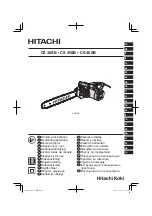
10
ADDITIONAL SAFETY INSTRUCTIONS FOR
PETROL CHAINSAW (Cont.)
Follow the manufacturer’s sharpening and maintenance instructions for the saw
chain.
equivalent.
These are available from authorized service dealers. Use of any unauthorized parts
or accessories could lead to serious injury to the operator or damage to the unit and
will void the warranty.
Use devices, such as low-kickback chains, guide bar nose guards, chain brakes and
special guide bars, which reduce the risks associated with kickback.
Installing the Guide Bar and Chain
bolts are in the guide bar slot (Fig. 4). Push the guide bar back as far as it will
go against the drive sprocket.
2. Lay out the saw chain in a loop and straighten any kinks.
3. Place the chain over the drive sprocket and into the groove of the guide bar (Fig.
5). Begin at the top of the guide bar.
NOTE: Make sure the chain is correctly installed and the cutters are facing in the
correct direction. The cutters on the top of the guide bar should face toward the
guide bar tip in the direction of chain rotation (Fig. 6). If they face backward, turn the
loop over.
NOTE: Make sure the chain-tensioning pin is in the chain-tensioning pin hole
(Fig. 7).
4. Replace the guide bar cover and bar-retaining nuts. Tighten the bar-retaining nuts
hand tight.
NOTE: Do not over-tighten the bar-retaining nuts. The guide bar should still be free
to move for chain tension adjustment.
5. Adjust the chain tension. Refer to the Adjusting the Chain Tension nstructions.
6. Hold the tip of the guide bar up and securely tighten the bar-retaining nuts.
ADDING BAR AND CHAIN LUBRICANT
The guide bar and saw chain require lubrication to minimize friction. Never starve
the guide bar and chain of lubricating oil. Running the unit without enough oil will
amount of lubricating oil is evidenced by smoke, guide bar discoloration or pitch
build-up.
ASSEMBLY INSTRUCTIONS










































